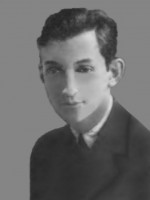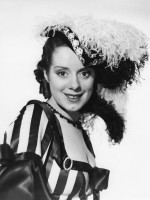Charles Laughton is a Actor, Director, Scriptwriter, Producer and Additional Writing British born on 30 june 1899 at Scarborough (United-kingdom)

Charles Laughton (1 July 1899 – 15 December 1962) was an English stage and film character actor, director, producer and screenwriter who had a successful career in Hollywood.
Laughton was trained in London at the Royal Academy of Dramatic Art and first appeared professionally on the stage in 1926. In 1927, he was cast in a play with his future wife Elsa Lanchester, with whom he lived and worked until his death; they had no children.
He played a wide range of classical and modern parts, making a big impact in Shakespeare at the Old Vic. His film career took him to Broadway and then Hollywood, but he also collaborated with Alexander Korda on some of the most notable British films of the era, including The Private Life of Henry VIII.
Laughton, was one of the most recognisable and beloved character actors of his generation, and portrayed everything from monsters and misfits to kings. Among Laughton's biggest film-hits were The Barretts of Wimpole Street, Mutiny on the Bounty, Ruggles of Red Gap, Jamaica Inn, The Hunchback of Notre Dame, and The Big Clock. In his later career, he took up stage directing, notably in The Caine Mutiny Court Martial, and George Bernard Shaw's Don Juan in Hell, in which he also starred. He directed one film, the acclaimed thriller The Night of the Hunter.
Laughton has been seen by some actors as one of the greatest performers of his generation. Sir Daniel Day-Lewis has cited him as one of his inspirations, saying "He was probably the greatest film actor who came from that period of time. He had something quite remarkable. His generosity as an actor, he fed himself into that work. As an actor, you cannot take your eyes off him.
Although Laughton's bisexuality has been corroborated by several of his contemporaries and is generally accepted by Hollywood historians, actress Maureen O'Hara, a friend and co-star of Laughton, has disputed the contention that his sexuality was the reason Laughton and Lanchester did not have children. O'Hara claimed Laughton told her that he had wanted children, but that it had not been possible because of a botched abortion that Lanchester had early in her career of performing burlesque. In her own autobiography, Lanchester acknowledged two abortions in her youth — one of the pregnancies purportedly by Laughton — although she didn't mention whether she had been rendered infertile. According to her biographer, Charles Higham, the reason she did not have children was that she did not want any.
Laughton owned a spectacular estate on the bluffs above Pacific Coast Highway at 14954 Corona Del Mar in Pacific Palisades. The property suffered a landslide in 1944, alluded to by Bertolt Brecht in his poem "Garden in Progress".
Source : Wikidata
Charles Laughton

Nationality United-kingdom
Birth 30 june 1899 at Scarborough (United-kingdom)
Death 15 december 1962 (at 63 years) at Hollywood (USA)
Awards Academy Award for Best Actor
Birth 30 june 1899 at Scarborough (United-kingdom)
Death 15 december 1962 (at 63 years) at Hollywood (USA)
Awards Academy Award for Best Actor
Charles Laughton (1 July 1899 – 15 December 1962) was an English stage and film character actor, director, producer and screenwriter who had a successful career in Hollywood.
Laughton was trained in London at the Royal Academy of Dramatic Art and first appeared professionally on the stage in 1926. In 1927, he was cast in a play with his future wife Elsa Lanchester, with whom he lived and worked until his death; they had no children.
He played a wide range of classical and modern parts, making a big impact in Shakespeare at the Old Vic. His film career took him to Broadway and then Hollywood, but he also collaborated with Alexander Korda on some of the most notable British films of the era, including The Private Life of Henry VIII.
Laughton, was one of the most recognisable and beloved character actors of his generation, and portrayed everything from monsters and misfits to kings. Among Laughton's biggest film-hits were The Barretts of Wimpole Street, Mutiny on the Bounty, Ruggles of Red Gap, Jamaica Inn, The Hunchback of Notre Dame, and The Big Clock. In his later career, he took up stage directing, notably in The Caine Mutiny Court Martial, and George Bernard Shaw's Don Juan in Hell, in which he also starred. He directed one film, the acclaimed thriller The Night of the Hunter.
Laughton has been seen by some actors as one of the greatest performers of his generation. Sir Daniel Day-Lewis has cited him as one of his inspirations, saying "He was probably the greatest film actor who came from that period of time. He had something quite remarkable. His generosity as an actor, he fed himself into that work. As an actor, you cannot take your eyes off him.
Biography
In 1927, Laughton began a relationship with Elsa Lanchester, at the time a cast mate in a stage play. The two were married in 1929, became US citizens in 1950, and remained together until Laughton's death. Over the years, they appeared together in several films, including Rembrandt (1936), Tales of Manhattan (1942) and The Big Clock (1948). Lanchester portrayed Anne of Cleves, Henry VIII's fourth wife, opposite Laughton in The Private Life of Henry VIII. They both received Academy Award nominations for their performances in Witness for the Prosecution (1957)—Laughton for Best Actor, and Lanchester for Best Supporting Actress—but neither won.Although Laughton's bisexuality has been corroborated by several of his contemporaries and is generally accepted by Hollywood historians, actress Maureen O'Hara, a friend and co-star of Laughton, has disputed the contention that his sexuality was the reason Laughton and Lanchester did not have children. O'Hara claimed Laughton told her that he had wanted children, but that it had not been possible because of a botched abortion that Lanchester had early in her career of performing burlesque. In her own autobiography, Lanchester acknowledged two abortions in her youth — one of the pregnancies purportedly by Laughton — although she didn't mention whether she had been rendered infertile. According to her biographer, Charles Higham, the reason she did not have children was that she did not want any.
Laughton owned a spectacular estate on the bluffs above Pacific Coast Highway at 14954 Corona Del Mar in Pacific Palisades. The property suffered a landslide in 1944, alluded to by Bertolt Brecht in his poem "Garden in Progress".
Best films
Usually with
Filmography of Charles Laughton (55 films)
Actor
 , 1h37
, 1h37Origin USA
Genres Documentary
Themes Films about films, Documentary films about business, Documentary films about the film industry, Documentary films about films
Actors Fairuza Balk, Richard Stanley, Robert Shaye, Michael Gingold, Edward R. Pressman, Marco Hofschneider
Roles Self (archive footage)
Rating74%





In Lost Soul Gregory looks at the filming of The Island of Dr. Moreau, specifically the period during which director Richard Stanley spent on the project. Stanley was brought on to the project early but was fired only a few days after principal photography began and was replaced by John Frankenheimer. The documentary looks into Stanley's vision for the film, as he had spent years working on the movie's script and had intended for Bruce Willis to star as Edward, a role that was later given to Val Kilmer- a move that Stanley viewed as a mistake. Lost Soul features interviews with several people involved with the movie's production and focuses on various aspects of the film, including numerous changes to the script and reports that Kilmer was difficult to deal with on set.

Dead Men Don't Wear Plaid (1982)
, 1h28Directed by Carl Reiner
Origin USA
Genres Thriller, Comedy, Comedy thriller, Action, Crime, Romance
Actors Steve Martin, Rachel Ward, Carl Reiner, Alan Ladd, Reni Santoni, Barbara Stanwyck
Roles (in "The Bribe") (archive footage)
Rating67%





In the opening scene, John Hay Forrest (George Gaynes), noted scientist and cheesemaker, dies in a single-vehicle car accident (represented by the car wreck scene from Keeper of the Flame). In the next scene, private investigator Rigby Reardon (Steve Martin) is reading a newspaper when Forrest's daughter, Juliet (Rachel Ward), enters his office and faints when the paper's headline reminds her of her father's death. Upon coming to, she hires Rigby to investigate the death, which she thinks was murder. In Dr. Forrest's lab, Rigby finds two lists, one titled "Friends of Carlotta" and the other "Enemies of Carlotta", as well as an affectionately autographed photo of singer Kitty Collins, whose name appears on one of the lists. His search is interrupted by a man posing as an exterminator (Alan Ladd, in This Gun for Hire), who shoots Rigby in the arm and frisks the lists from the seemingly dead investigator.
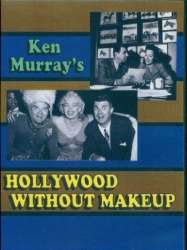
Hollywood Without Make-Up (1963)
Directed by Ken Murray
Origin USA
Genres Documentary
Themes Documentary films about business, Documentary films about the film industry, Documentary films about cities
Actors Kirk Douglas, Ken Murray, Cary Grant, June Allyson, George K. Arthur, Eddie Albert
Roles Self (archive footage)
Rating71%





The film consists of archive footage of famous Hollywood stars, mostly home movies showing the stars as themselves instead of playing a role in front of the camera.
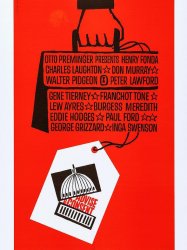
Advise & Consent (1962)
, 2h19Directed by Otto Preminger
Origin USA
Genres Drama, Politic
Themes Politique, Films about sexuality, LGBT-related films, Political films, LGBT-related films, LGBT-related film
Actors Henry Fonda, Charles Laughton, Don Murray, Walter Pidgeon, Peter Lawford, Gene Tierney
Roles Senator Seabright Cooley
Rating76%





The President of the United States (Franchot Tone) nominates Robert A. Leffingwell (Henry Fonda) as Secretary of State. The second-term President, who unbeknownst to the public is ill, has chosen Leffingwell because he does not believe that Vice President Harley Hudson (Lew Ayres)—someone he and others generally tolerate or ignore—could successfully continue the administration's foreign policy should he die.

Under Ten Flags (1960)
, 1h40Directed by Carlo Lizzani, Duilio Coletti
Origin Italie
Genres War, Historical
Themes Seafaring films, Transport films, La bataille de l'Atlantique, Political films
Actors Van Heflin, Charles Laughton, Mylène Demongeot, Folco Lulli, Gian Maria Volonté, Guido Celano
Roles Admiral Russell
Rating64%





Loosely based on actual events during World War II, the film depicts real life German Captain Bernhard Rogge commanding the navy raider Atlantis, which from May 1940 to November 1941 sank 22 Allied merchant ships. The story alternates between scenes at the Admiralty and scenes at sea, particularly showing Captain Rogge's humanity and chivalrous conduct of his military engagements. Rogge was one of the few German flag rank officers who was not arrested by the Allies after the war, due to his conduct as a military officer. After eighteen months of successful raids, Atlantis was sunk on 22 November 1941 by the British cruiser Devonshire.

Spartacus (1960)
, 3h4Directed by Stanley Kubrick, Anthony Mann
Origin USA
Genres Drama, War, Action, Adventure, Historical, Peplum
Themes Films about slavery, Films about sexuality, Sports films, Bisexuality-related films, LGBT-related films, Political films, LGBT-related films, LGBT-related film
Actors Kirk Douglas, Laurence Olivier, Jean Simmons, Charles Laughton, Peter Ustinov, John Gavin
Roles Sempronius Gracchus
Rating78%





In the 1st century BC, the Roman Republic has slid into corruption, its menial work done by armies of slaves. One of these, a proud and gifted man named Spartacus, is so uncooperative in his servitude that he is sentenced to fight as a gladiator. He is trained at a school run by the unctuous Roman businessman Lentulus Batiatus, who instructs Spartacus's trainer Marcellus to bully the slave mercilessly and break his spirit. Amid the abuse, Spartacus forms a quiet relationship with a serving woman named Varinia, whom he refuses to rape when she is sent to "entertain" him in his cell.

Witness for the Prosecution (1957)
, 1h56Directed by Billy Wilder
Origin USA
Genres Drama, Thriller, Crime
Themes Théâtre, Films based on plays
Actors Tyrone Power, Marlene Dietrich, Charles Laughton, Elsa Lanchester, Una O'Connor, John Williams
Roles Sir Wilfrid
Rating83%





Sir Wilfrid Robarts (Charles Laughton), a master barrister in ill health, takes on Leonard Vole (Tyrone Power) as a client, despite the objections of his private nurse, Miss Plimsoll (Elsa Lanchester), who says the doctor warns him against taking on any criminal cases. Vole is accused of murdering Mrs. Emily French (Norma Varden), a rich, older widow who had become enamored of him, going so far as to make him the main beneficiary of her will. Strong circumstantial evidence points to Vole as the killer, but Sir Wilfrid believes Vole is innocent.
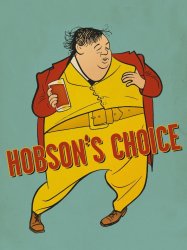
Hobson's Choice (1954)
, 1h47Directed by David Lean
Origin United-kingdom
Genres Drama, Comedy, Comedy-drama
Themes Théâtre, Films based on plays
Actors Charles Laughton, John Mills, Brenda De Banzie, Prunella Scales, Daphne Anderson, Richard Wattis
Roles Henry Horatio Hobson
Rating76%





Willie Mossop (John Mills) is a gifted but unappreciated bootmaker employed by the tyrannical Henry Horatio Hobson (Charles Laughton) in his moderately upmarket shop in 1880s Salford in Lancashire. Hard-drinking widower Hobson has three daughters. Maggie (Brenda De Banzie) and her younger sisters Alice (Daphne Anderson) and Vicky (Prunella Scales) have worked in their father's establishment without wages and are eager to be married and free of the shop. Alice has been seeing Albert Prosser (Richard Wattis), a young up-and-coming solicitor, while Vicky prefers Freddy Beenstock (Derek Blomfield), the son of a respectable corn merchant. Hobson does not object to losing Alice and Vicky, but Maggie is far too useful to part with. To his friends, he mocks the plain, severe Maggie as a spinster "a bit on the ripe side" at 30 years of age.
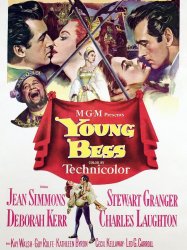
Young Bess (1953)
, 1h52Directed by George Sidney
Origin USA
Genres Drama, Biography, Historical, Romance
Themes Politique, Political films, Films about royalty
Actors Jean Simmons, Stewart Granger, Kay Walsh, Deborah Kerr, Charles Laughton, Cecil Kellaway
Roles King Henry VIII
Rating65%





Following the execution of her mother, Anne Boleyn (Elaine Stewart), for infidelity, Elizabeth (Jean Simmons) is exiled to Hatfield House and declared illegitimate (thereby losing her place in line for the throne) by her father, King Henry VIII (Charles Laughton). She is accompanied by her loyal servants, Mr. Parry (Cecil Kellaway) and her governess Mrs. Ashley (Kay Walsh). Over the years, her position rises and falls on the whim of her father.

Salome (1953)
, 1h43Directed by William Dieterle, Earl Bellamy
Origin USA
Genres Drama, Peplum, Romance
Themes Films set in Africa, Films about religion, Films based on the Bible, Portrayals of Jesus in film
Actors Rita Hayworth, Stewart Granger, Charles Laughton, Judith Anderson, Cedric Hardwicke, Alan Badel
Roles King Herod
Rating58%





Although based on the New Testament story, the film does not follow the biblical text.
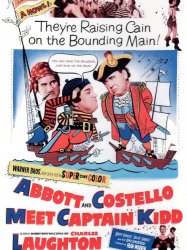 , 1h10
, 1h10Directed by Charles Lamont
Origin USA
Genres Comedy, Adventure, Musical
Themes Seafaring films, Transport films, Pirate films, Musical films
Actors Bud Abbott, Lou Costello, Charles Laughton, Hillary Brooke, Leif Erickson, Bill Shirley
Roles Capt. William Kidd
Rating57%





Oliver "Puddin' Head" Johnson (Lou Costello) and Rocky Stonebridge (Bud Abbott) are on their way to Death's Head Tavern, where they work. They encounter Lady Jane (Fran Warren), who asks them to bring a love note to the tavern singer, Bruce Martingale (Bill Shirley).

O. Henry's Full House (1952)
, 1h57Directed by Henry King, Henry Hathaway, Howard Hawks, Jean Negulesco, Henry Koster
Origin USA
Genres Drama, Comedy
Themes Christmas films, Children's films
Actors Anne Baxter, Jeanne Crain, Farley Granger, Charles Laughton, Oscar Levant, Marilyn Monroe
Roles Soapy (segment "The Cop and the Anthem")
Rating71%





Voir ci-dessous les sections détaillées, les sketches n'ayant aucun rapport entre eux.

The Blue Veil (1951)
, 1h53Directed by Busby Berkeley, Curtis Bernhardt
Origin USA
Genres Drama
Actors Jane Wyman, Charles Laughton, Joan Blondell, Richard Carlson, Agnes Moorehead, Don Taylor
Roles Fred K. Begley
Rating71%





Following the death of her newborn baby, war widow LouLou Mason accepts a temporary two-week assignment as nursemaid to the infant son of corset manufacturer Frederick K. Begley, who lost his wife in childbirth. She ingratiates herself with the family and eventually becomes a permanent fixture. When she declines Frederick's proposal, he marries his secretary Alicia Torgersen, who fires LouLou following her honeymoon.
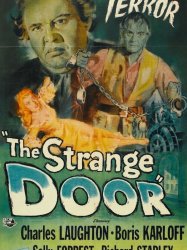
The Strange Door (1951)
, 1h21Directed by Joseph Pevney
Origin USA
Genres Thriller, Horror, Historical
Actors Charles Laughton, Boris Karloff, Sally Forrest, Richard Stapley, Allison Hayes, Alan Napier
Roles Sire Alain de Maletroit
Rating61%





Alain, the Sire de Maletroit (Laughton), plots revenge on his younger brother Edmund (Cavanagh) for stealing Alain's childhood sweetheart, now deceased. Alain imprisons Edmund in a dungeon for 20 years. He then convinces Edmund's grown daughter Blanche (Forrest) that her father is dead. As Blanche's mother (Alain's lost love) died in childbirth, Maletroit intends to further antagonize Blanche by reducing her life to a miserable hell. As the film begins, he tricks a high-born drunken cad, Denis de Beaulieu (Richard Stapley), to pass through the sole, exterior door of the Maletroit chateau, which has no latch handle on the inside, making him a captive, with the intent of forcing the delicate Blanche into marriage with him. However, Denis has unanticipated redemptive qualities, and he and Blanche fall in love. Their attempt to escape is initially foiled by Alain, who seals Edmund, Blanche and Denis in a stone deathtrap designed to crush the lot of them. Maletroit's disloyal manservant Voltan (Karloff) comes to their aid and dies effecting the escape of Denis, Blanche and her father from a dungeon cell, the walls of which are crushing in on them under pressure of river water churned against them by a water wheel on the chateau.

The Man on the Eiffel Tower (1950)
, 1h37Directed by Charles Laughton, Burgess Meredith, Irving Allen
Origin USA
Genres Thriller, Crime
Actors Charles Laughton, Franchot Tone, Burgess Meredith, Robert Hutton, Patricia Roc, Wilfrid Hyde-White
Roles Inspector Jules Maigret
Rating57%





In Paris, a down and out medical student Johann Radek (Franchot Tone) is paid by Bill Kirby (Robert Hutton) to murder his wealthy aunt. A knife grinder (Burgess Meredith) is suspected, but Radek keeps taunting the police until they realize that he is the killer. The police and Maigret (Charles Laughton) are led on chases through the streets and over the rooftops of Paris and finally up the girders of the Eiffel Tower.
 Connection
Connection





